Fireworks Safety :
Introduction:
Diwali is thoroughly enjoyed by people of all age groups as they love the splendor and sparkle of fireworks. The earthen lamps that we light on Diwali night are generally placed on balcony and window ledges. So ensure that these are not near any flammable material like wood, cloth or paper. Usually, decorative lights are used on special occasions only and as such not much care is given to one's life. The electric lights should never be tied to any metal poles as any current leak can energize the pole and give a shock to anyone who touches the pole.
All accidents due to fireworks occur as a result of carelessness, negligence and ignorance. But these can certainly be avoided by observing some very simple precautions. All of us enjoy the pleasure of light and sound but when disaster strikes the injured has to bear the cross. If you're going to set off fireworks at home this year, please take a few minutes to read through the guidelines.
This study has been approved by the department research committee and has been done in accordance with the Helsinki protocol. This is a retrospective hospital-based study involving data from 2002 to 2010. The Department of Burns, Plastic and Maxillofacial Surgery at VMMC and Safdarjung Hospital maintains the records of firecracker-related injuries of the patients during these 3 days of Diwali festival, i.e. pre-Diwali, Diwali and post-Diwali days, when the disaster protocol is in place. The disaster protocol is supported and monitored by the Ministry of Health and Family welfare, Government of India. The year-wise incidence is recorded in tabel:1 shown below. A total of 1373 patients visited the emergency clinic around Diwali over these 9 years.
Table 1: Number of firecracker-related injury patients around Diwali and their age distribution from 2002 to 2010
Considering the noise pollution caused by the firecrackers, the Supreme Court of India, which is the apex court, passed a legislation in the year 2005, to stop the noise pollution between 10 p.m. and 6 a.m. of the following day. The authors analyzed the impact of the prohibitive orders of the apex court on the reporting of firecracker-related injuries in our hospital.
Results:
Exactly 1373 patients with firecracker-related injury attended the burn casualty over a period of 3 days around Diwali festival from, 2002 to 2010. There has been a continuous increase in the number of patients over the past 9 years, barring a small reduction in 2003 and 2007 [Figure 1]. There has been an obvious male preponderance (84.8%) in the occurrence of the injury [Figure 1].
Figure 1: Year-wise distribution of patients with firecracker-related injuries around Diwali festival
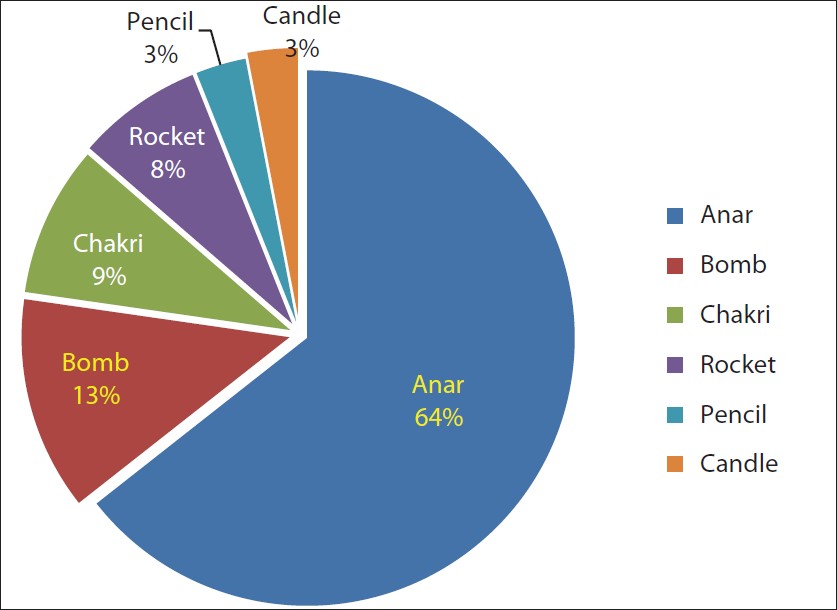
Figure 2: Types of fireworks causing injury around Diwali festival
Being a retrospective study, the details of the mode of injury were not available in the records of majority of them. The detail of the firecrackers causing the injury was available for 230 patients. The Anar (flower pot) was found to be the most common causative agent, closely followed by Bombs (sound-emitting fireworks) [Figure 2].
Firecrackers are commonly used during celebrations because of their sound, sparkle and sudden burst of colours, expressing the festive mood. They are used during Tihar in Nepal, Hari Raya in Malaysia, Day of Ashura in Morocco, Guy Fawkes Night or bonfire night in the United Kingdom, Independence Day and Halloween in the USA, Bastille Day in France, Spanish Fallas and New Year's Day in Guatemala, Chinese New Year by the Chinese and many other festivals all over the world.
Store your fireworks safely: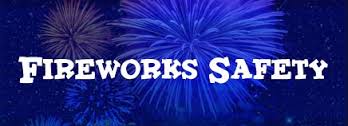
In a closed box, somewhere cool and dry, out of reach of children and animals and away from all sources of heat, until the time they're needed. Locked away is best. Don't keep the box under the stairs or in a passageway.
Pets hate bangs and flashes:
Pets get very frightened on fireworks night, so keep all your pets indoor and close all the curtains to make things calmer. Remember it's not just your own fireworks that cause distress, so you may have to have your pets indoors on several nights when other displays are taking place.
Think ahead and be prepared:
Before you start, make sure you'll be giving yourself enough room in a safe place to get to and from your box of fireworks while the display is going on. Have a full bucket of water handy for any emergency, and for putting used sparklers into. If you have the chance to get together with some other families, try to go to the home with the biggest open space and safest surroundings.
Never try to re-ignite the fireworks that don't light in the first instance. Never give ANY firework item to small children. Never throw fireworks at another person. Never carry fireworks in your pocket. Never shoot fireworks from metal or glass containers. Never experiment, modify, or attempt to make your own fireworks.
Watch what you wear:
Loose clothing can very easily catch fire, and should not be worn near any fire or fireworks. Long dangle scarves can be risky too. If anyone's clothing does catch fire, follow the rule: Stop - Don't run. Drop to the ground. Roll to put out the flames.
One at a time please:
You (or another adult that you choose) must be the only person letting off fireworks. Don't allow anyone else - especially children - to do so while your display is going on. Let the fireworks off one at a time (not lots at once) and don't rush. Light the tip of each firework at arm's length, using fireworks lighter or fuse wick. Stand well back immediately. If one doesn't go off, don't go back to it - it could still be live, and could go off unexpectedly on your face. Right at the end of your fireworks night, douse the 'duds' with lots of water, keep it soaking in a bucket of water. Never throw left over fireworks onto a bonfire.
The following fireworks must not be supplied to the general public:
- Aerial wheels
- Bangers, flash bangers or double bangers
- Jumping crackers
- Jumping ground spinners
- Spinners
- Mini rockets
- Shot tubes – previously known as air bombs
- Shot tubes – previously known as shell-in-mortar
- A battery containing bangers, flash bangers or double bangers
- A combination (other than a wheel) which includes one or more bangers, flash bangers or double bangers.
Different fireworks mean different hazards: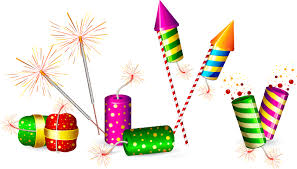
Read the instructions on each one carefully (by flashlight, never an open flame) and follow them properly. Rockets, for instance, should be launched from a rocket launcher, not from a bottle. Sparklers need careful handling - light them one at a time at arm's length; don't give one to any child under 5 years of age; make sure that anyone holding a sparkler wears gloves; and put each spent one into a bucket of water as soon as it's gone out.
No fooling:
Putting fireworks in your pocket is stupid and dangerous. Throwing fireworks at people is stupid and dangerous and illegal; it's a criminal offense to do so.
Fireworks and booze don't mix:
Drinking alcohol presents an added danger when there are fireworks and bonfires around. So don't drink during your fireworks display.
Watch that person:
Keep children well away from fireworks, and never let a child handle or light one. Even sparklers can be dangerous if unsupervised! Do not give sparklers to a child under five. Make sure that children are aware of the dangers.
First Aid: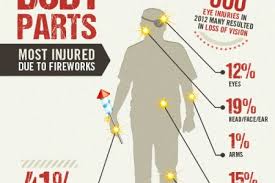
Burns happen when your skin comes into contact with something hot, such as fire, or if you are exposed to a radiated heat source, such as the sun.
Burns are usually divided into three categories depending on how much of the skin they affect. Superficial burns (first degree) affect the surface of the skin, making it red, swollen, and painful. This sort of burn can be treated at home and usually heals in between 7-10 days. Partial (second degree) and full thickness (third degree) burns are much more serious, and require medical attention.
Treating minor burns:
To treat superficial (minor) burns at home follow the advice below.
- Cool the skin using cool, or tepid, water for between 10-30 minutes, ideally within 20 minutes of the injury happening. This will prevent the burn getting worse.
- Do not use ice, iced water, creams, or greasy substances, such as butter to sooth the burn. A cool bath, or shower, will help to soothe the burn.
- If fingers or toes are burned, try and separate them with dry, sterile, non-adhesive dressings.
- Avoid any kind of friction or pressure on the burnt area.
- If the burn is painful, taking a mild painkiller, such as paracetamol, or ibuprofen, can help. However, always check the packaging to make sure that you take the correct dosage.
- Do not interfere with the burn, or break any blisters. If the burn is very painful, or seems to be getting worse Rush the victim to the hospital immediately.
- Deep, or large burns, or burns to the face, hands, or across joints, must always be checked by a doctor and may require hospital treatment.
Health & Environment friendly tips to celebrate Diwali: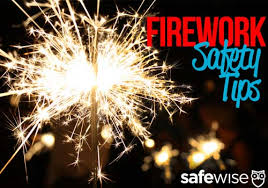
- Instead of individual celebration prefer community celebration. With the increasing trend of gated community all the families of the community can celebrate Diwali in the common space. This will ensure reduced cost of celebration; paper pollution in a limited space and as compared to individual celebration, community celebration will cause less air and noise pollution.
- Even while celebrating commonly make sure that you limit your celebration for a limited period of time. Your celebration can last for maximum 3 to 4 hours.
- Instead of electric illumination go for traditional lightening of earthen lamps or diyas. This will not only enhance the beauty of your house but will also cut down the enormous electric consumption. Though earthen lamps need oil but the quantity is less and it gives light for at least 3-4 hours.
- Cut down your shopping list and avoid purchasing unwanted and unnecessary things this Diwali. Excess consumerism is directly related to the consumption of raw material used to manufacture those things. Excessive consumerism increases the undue pressure on the natural resources.
- Instead of buying “one-time use” items go for recyclable things. Secondly while cleaning your home for Deepawali instead of disposing things it is better to give it to under-privilege people.
- Celebrate Diwali with a different meaning. You can celebrate this Diwali with poor and under-privilege children. Share your Diwali crackers, sweets and happiness with poor children.
Don't light flying fireworks if there is a heavy wind
Never take unnecessary risks while lighting fireworks, just to show off. Pool your pocket money and have a professional perform pyrotechnics for the benefit of many Dos & Don't s While Bursting Crackers
The Do’s
- Make sure you buy Fireworks from a licensed shop.
- Always keep the fireworks in a closed box.
- Store crackers away from sources of fire or ignition also keep them away from the reach of children.
- Read the instructions and follow all safety precautions recommended for the use of fire works.
- Light crackers in open spaces.
- While lighting the crackers stand at an arm’s length from the cracker.
- Discard used fireworks in a bucket of water. In this manner you can avoid people from stepping on to and hurting their feet from used fireworks which are thrown on the ground.
- Keep buckets of water and blankets ready, in case a firebreaks out.
- Wear heavier cotton clothes while lighting crackers so as to ensure maximum safety from fire.
- If your clothes happen to catch fire, do not panic, drop down on the ground and roll.
- Store water and keep it ready near the place of fireworks celebrations.
- Keep a wet towel ready to cover your exposed parts when some crackers may accidentally burst.
- Keep the regulators of your cooking gas cylinders turned off and do not keep the cylinders in balconies or open spaces to keep them protected from stray rockets.
- Put earplugs (or cotton wool) in your ears.
- Keep small portable extinguishers handy for urgent use.
The Don t's
- Don't ignite fireworks while holding them.
- Don't bend over the fireworks being ignited.
- Don't ignite fireworks in any container.
- Don't approach immediately to the misfired fireworks.
- Don't tamper with misfired fireworks.
- Don't attempt to make fireworks at home.
- Don't allow small children to handle fireworks.
- Don't throw or point fireworks at other people.
- Don't carry fireworks in the pocket.
- Don't store firecrackers near burning candles and diyas.
- Don't light firecrackers in narrow by lanes; preferably use open areas and parks.
- Don't wear synthetic clothing; preferably wear thick cotton clothing.
- Don't wear loosely hanging clothes; secure all clothes properly.
- Don't apply any cream or ointment or oil on burnt area.
- Don't drive recklessly while taking a burn victim to the hospital; a delay of up to one hour is immaterial.
FIREWORKS SAFETY POSTERS
Click the below link to download fireworks safety guidelines

Dos and Don t's - Fireworks safety
Power Point Presentation - Fireworks safey